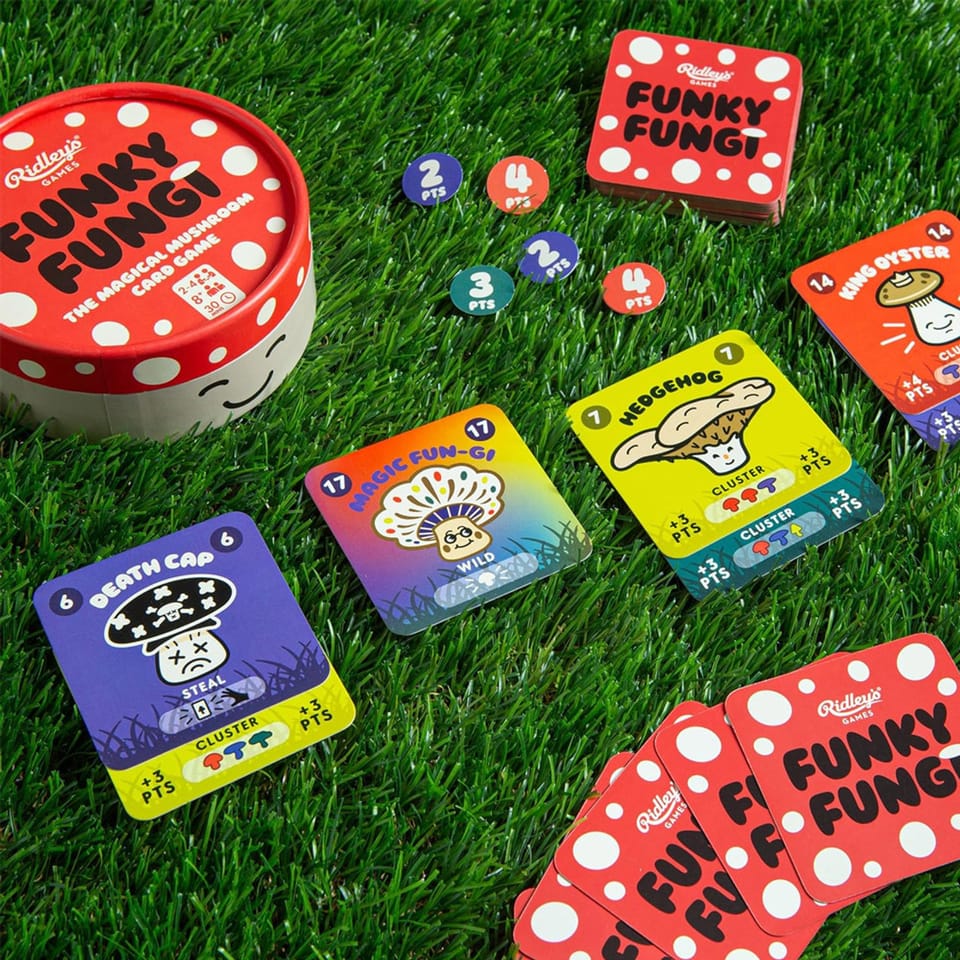A Game That's Better Than Expected

Last night I played Funky Fungi, a boardgame in the genre of "boardgames which you buy as an impulse purchase when approaching the tills at Marks and Sparks". It was... surprisingly good. Inspiring, even? Let's talk about it.
So first, the ways it fits that genre: it's cheap to produce, with most of the cost going towards the packaging. Just a stack of cards & some paper score markers. It's called "Funky Fungi" and the box has a face on it but is not quite actually charming. The game has some super powerful trump cards, and some easy to understand powers which give an opportunity for some cheap "ah-hah! got you" to the family member you are presumably playing this with. The instructions fit on a single sheet of paper and yet they are not so easily comprehended that you marvel at the playtesting that must have been required to smooth off so many sharp corners. The visual design, too, has cute pictures of mushrooms and yet pivots on small icons in hard to distinguish colours (technically the icons are different shapes, but not different enough). And the cute pictures of mushrooms that dominate the cards turn out to have little gameplay significance.
I'm gonna stop being mean about it now - as I said, it's in a particular genre, many of those are necessary or inevitable or arguably desirable features for the genre. Except maybe the tiny confusing icons, but then we were playing in a dimly lit pub.
But! What's the actual game? Well, it's a trick taking game - someone puts down a card in a suit, everyone else has to follow the suit if they can, and the highest card within that suit wins (or a trump card, if that's played). But winning the trick just determines the order that the cards played in that round are picked up. And then there is this whole second layer, which is about arranging the cards you've picked up in order to score them. The details of the arranging don't matter too much - except that it means that you end up playing the trick taking game focused not on winning but on what cards you can pick up - what powers and what suits the cards are, to be more specific. If you need a red card and this hand is red, then probably you don't need to win the hand - you're probably picking up a red anyway. If you want a trump card and you have a trump card... you can probably just play your trump card and then pick it back up again. Unless there's a steal or a swap in this round, in which case maybe you have to be more careful. For that matter, if you need a trump that's probably because you want to complete a particular set - and playing a trump will likely let you choose the colour of two cards you pick up, the trump (any colour) and then the card you'll start the next hand with.
This was enhanced by some incorrect rules we played with - the idea that you could score your collections at any time, and that a Protect card could protect a whole incomplete collection from steals. Something very appealing to me about a game where there's a solo real time element fed by a more interactive turn taking element. Rearranging the cards in front of me to shuffle things under a larger collection to protect them, before hiving some off to score them quickly. A simple mechanic that's not necessarily played to win but for beneficial side effects. Hinting at, nudging towards, the kind of powerful resolution mechanics we ended up implementing in code for Beasts of Balance Battles (with cards), or that JW figured out for Dust Biters. Except here it clearly wasn't intentional, it's just a side effect of following the market expectations of "simple powers, like stealing a card" and "oh but it's annoying if stuff can always get stolen, you should be able to protect that" (BoB Battles & Dust Biters also have both of these cards in them).
Anyway, yeah, I guess it made me want to make a card game. Been ending up doing some bits of game design recently, and it turns out that can be a real fun thing to stretch your brain with. Maybe I should consider doing it as a job? *
(* note: this a joke, I am a professional game designer. Except in practice the "designing games" part of my work takes up a much smaller part of my time than the "talking to people about game design", "implementing game designs" and "seeing if the game designs actually work". I think this is what it means to be a professional.)
Member discussion